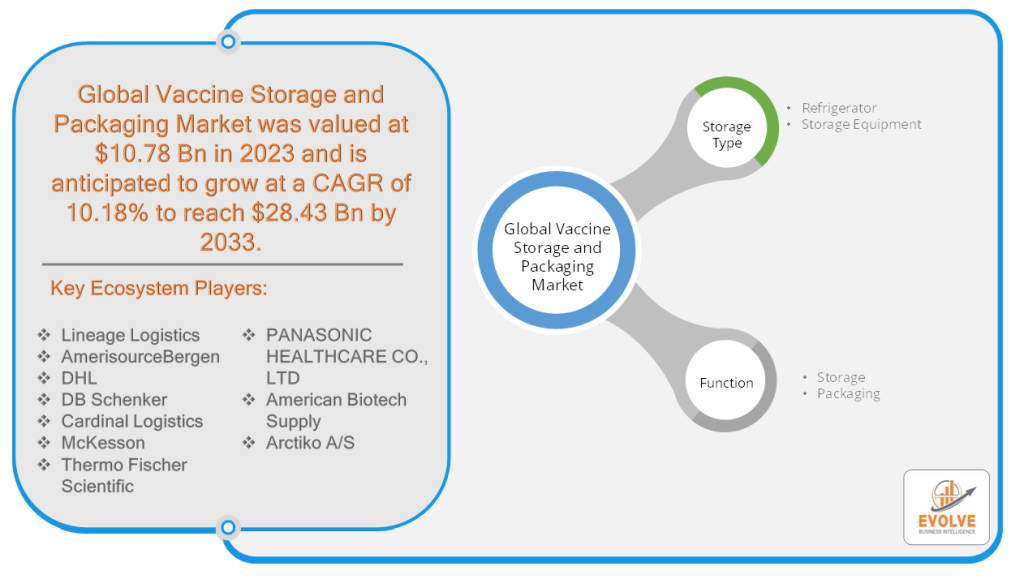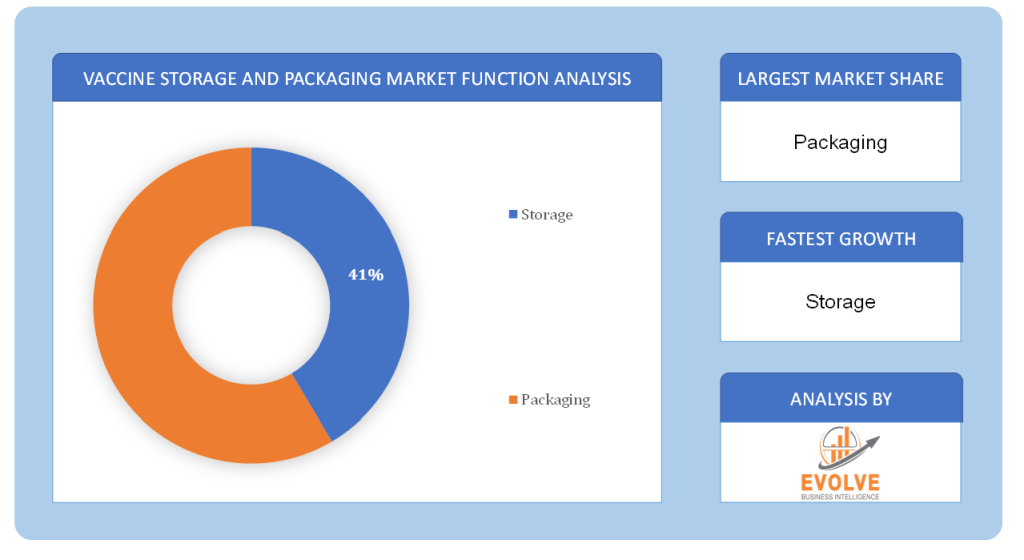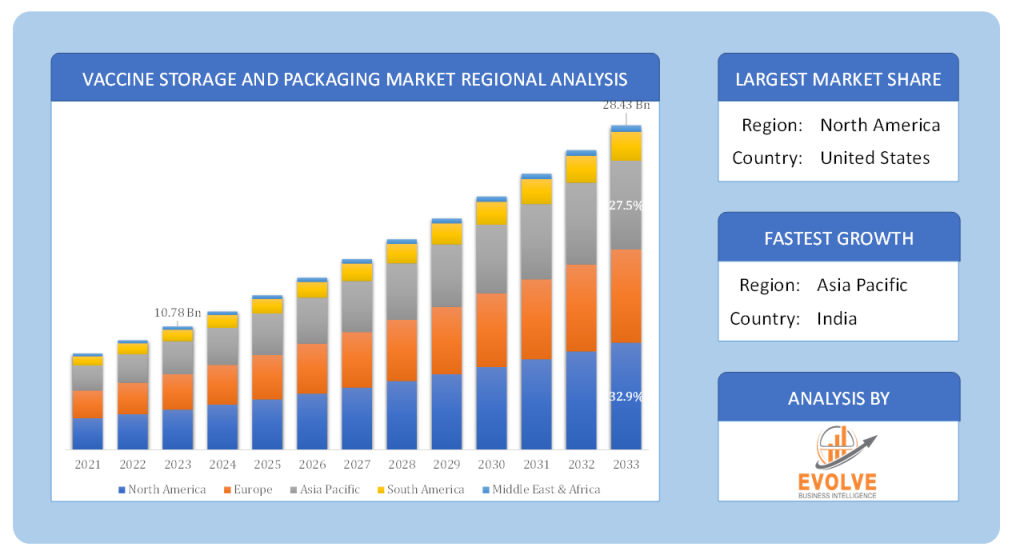Vaccine Storage and Packaging Market Analysis and Global Forecast 2021-2033
$ 1,390.00 – $ 5,520.00Price range: $ 1,390.00 through $ 5,520.00
Vaccine Storage and Packaging Market Research Report: Information By Function (Storage, Packaging), and By Region — Forecast till 2033
Vaccine Storage and Packaging Market Overview
The global Vaccine Storage and Packaging Market Analysis Size is expected to reach USD 28.43 Billion by 2033. The global Vaccine Storage and Packagingindustry size accounted for USD 10.78 Billion in 2023 and is expected to expand at a compound annual growth rate (CAGR) of 10.18% from 2023 to 2033. The vaccine storage and packaging market plays a crucial role in maintaining the efficacy and safety of vaccines, which are vital for preventing and controlling infectious diseases. Proper storage and packaging conditions are essential to preserve the potency of vaccines and extend their shelf life. This market encompasses a wide range of equipment, materials, and technologies designed to maintain the integrity of vaccines throughout their distribution and storage process. From refrigeration systems to specialized packaging solutions, the vaccine storage and packaging market provides the necessary infrastructure for the effective delivery of vaccines to healthcare facilities and end-users worldwide.
Global Vaccine Storage and Packaging Market Synopsis
The COVID-19 pandemic has brought unprecedented attention to the importance of vaccine storage and packaging. With the global distribution of vaccines against the SARS-CoV-2 virus, the demand for reliable storage and packaging solutions has surged. Cold chain management, including ultra-low temperature storage, has become critical to maintain the stability of mRNA-based vaccines like the Pfizer-BioNTech and Moderna vaccines. Additionally, the need for temperature-controlled logistics has created opportunities for innovative packaging technologies such as thermal insulators and temperature-monitoring sensors..
Vaccine Storage and Packaging Market Dynamics
The major factors that have impacted the growth of Vaccine Storage and Packaging are as follows:
Drivers:
Technological Advancements Revolutionizing Vaccine Storage
In recent years, technological advancements have significantly influenced the vaccine storage and packaging market. These advancements include the development of advanced refrigeration systems with precise temperature control, smart packaging solutions, and real-time monitoring devices. These innovations ensure the integrity of vaccines during transportation, storage, and distribution. With the adoption of cutting-edge technologies, the industry can mitigate the risk of temperature excursions, reduce vaccine wastage, and improve overall efficiency in the supply chain.
Restraint:
- High Initial Investment and Infrastructure Challenges
While the vaccine storage and packaging market presents immense growth potential, high initial investment costs and infrastructure challenges pose significant barriers. Setting up and maintaining temperature-controlled storage facilities and purchasing specialized packaging equipment can be costly, particularly for smaller healthcare providers or facilities in remote areas. Moreover, ensuring a consistent power supply in regions with inadequate infrastructure can be a challenge, as interruptions in electricity can lead to temperature fluctuations and compromise the quality of vaccines.
Opportunity:
⮚ Growing Global Immunization Programs
The expansion of global immunization programs presents a significant opportunity for the vaccine storage and packaging market. Governments and international organizations are increasingly focusing on vaccination campaigns to prevent the spread of infectious diseases and achieve better public health outcomes. This growing emphasis on immunization is driving the demand for efficient storage and packaging solutions to maintain the quality and potency of vaccines. Furthermore, the introduction of novel vaccines, such as those for COVID-19 and other emerging diseases, fuels the need for advanced storage and packaging technologies.
Vaccine Storage and PackagingSegment Overview
By Storage Type
Based on the storage type, the market is segmented based on Refrigerator, Storage Equipment. the refrigerator function holds the largest market share. most vaccines require refrigerated storage between 2° and 8°C. Second, refrigerators are a mature technology that is widely available. Third, refrigerators are relatively affordable, making them a cost-effective option for vaccine storage. The storage equipment segment is the second largest in the storage type segment. This segment includes freezers, ultra-cold freezers, and cold chain containers. Storage equipment is used to store vaccines that require colder temperatures, such as -20°C or -70°C.
By Function
Based on the Function, the market is segmented based on Storage, and Packaging. the storage function holds the largest market share. Proper storage conditions, including temperature control and monitoring, are critical to maintaining vaccine potency. By investing in advanced storage systems and implementing robust temperature management protocols, healthcare providers can ensure the effectiveness of vaccines throughout their shelf life.
 Global Vaccine Storage and Packaging Market Regional Analysis
Global Vaccine Storage and Packaging Market Regional Analysis
Based on region, the global Vaccine Storage and Packaging market has been divided into North America, Europe, Asia-Pacific, South America and Middle East & Africa. North America is projected to dominate the use of the market followed by the Europe and Asia-Pacific regions.
 North America Market
North America Market
North America has emerged as a prominent market for vaccine storage and packaging solutions. The region boasts a well-established healthcare infrastructure and stringent regulatory standards, which have propelled the adoption of advanced storage and packaging technologies. The presence of leading pharmaceutical companies and research institutions further contributes to the region’s market growth. In addition, North America’s robust cold chain logistics network facilitates efficient vaccine distribution, ensuring the maintenance of optimal storage conditions throughout the supply chain.
Asia Pacific Market
Asia Pacific has also witnessed substantial growth in the vaccine storage and packaging market. The region encompasses diverse economies with varying levels of healthcare infrastructure. Countries like China and India, with their large populations and expanding immunization programs, are driving the demand for advanced storage and packaging solutions. Furthermore, the rising focus on healthcare infrastructure development and government initiatives to improve immunization coverage provide significant growth opportunities in the region. As Asia Pacific continues to experience rapid urbanization and increased access to healthcare, the demand for reliable storage and packaging solutions is expected to further escalate.
Competitive Landscape
The global Vaccine Storage and Packaging market is highly competitive, with numerous players offering a wide range of software solutions. The competitive landscape is characterized by the presence of established companies, as well as emerging startups and niche players. To increase their market position and attract a wide consumer base, the businesses are employing various strategies, such as product launches, and strategic alliances.
Prominent Players:
- Lineage Logistics
- AmerisourceBergen
- DHL
- DB Schenker
- Cardinal Logistics
- McKesson
- Thermo Fischer Scientific
- PANASONIC HEALTHCARE CO., LTD
- American Biotech Supply
- Arctiko A/S
Key Development:
June 2023: DHL introduced a groundbreaking smart packaging solution specifically designed for temperature-sensitive vaccines. The smart packaging incorporates temperature sensors, data loggers, and GPS tracking devices, enabling real-time monitoring of vaccine shipments. This technology ensures that vaccines are maintained within the required temperature range during transportation, mitigating the risk of temperature excursions and preserving vaccine efficacy.
Scope of the Report
Global Vaccine Storage and Packaging Market, by Function
- Storage
- Packaging
Global Vaccine Storage and Packaging Market, by Region
- North America
- US
- Canada
- Mexico
- Europe
- UK
- Germany
- France
- Italy
- Spain
- Benelux
- Nordic
- Rest of Europe
- Asia Pacific
- China
- Japan
- South Korea
- Indonesia
- Austalia
- Malaysia
- India
- Rest of Asia Pacific
- South America
- Brazil
- Argentina
- Rest of SouthAmerica
- Middle East &Africa
- Saudi Arabia
- UAE
- Egypt
- SouthAfrica
- Rest of Middle East & Africa
| Parameters | Indicators |
|---|---|
| Market Size | 2033: $28.43 Billion |
| CAGR | 10.18 % CAGR (2023-2033) |
| Base year | 2022 |
| Forecast Period | 2023-2033 |
| Historical Data | 2021 |
| Report Coverage | Revenue Forecast, Competitive Landscape, Growth Factors, and Trends |
| Key Segmentations | Function |
| Geographies Covered | North America, Europe, Asia-Pacific, Latin America, Middle East, Africa |
| Key Vendors | Lineage Logistics, AmerisourceBergen, DHL, DB Schenker, Cardinal Logistics, McKesson, Thermo Fischer Scientific, PANASONIC HEALTHCARE CO., LTD, American Biotech Supply, and Arctiko A/S |
| Key Market Opportunities | Growing Global Immunization Programs |
| Key Market Drivers | Technological Advancements Revolutionizing Vaccine Storage |
REPORT CONTENT BRIEF:
- High-level analysis of the current and future Vaccine Storage and Packaging market trends and opportunities
- Detailed analysis of current market drivers, restraining factors, and opportunities in the future
- Vaccine Storage and Packaging market historical market size for the year 2021, and forecast from 2023 to 2033
- Vaccine Storage and Packaging market share analysis at each product level
- Competitor analysis with a detailed insight into its product segment, Commercial Use strength, and strategies adopted.
- Identifies key strategies adopted including product launches and developments, mergers and acquisitions, joint ventures, collaborations, and partnerships as well as funding taken and investment done, among others.
- To identify and understand the various factors involved in the global Vaccine Storage and Packaging market affected by the pandemic
- To provide a detailed insight into the major companies operating in the market. The profiling will include the Commercial Use health of the company’s past 2-3 years with segmental and regional revenue breakup, product offering, recent developments, SWOT analysis, and key strategies.
Press Release

Global Pharmaceutical Manufacturing Market to Reach $1.38 Trillion by 2035 with 7.35% CAGR, New Research Shows

The Global Mammography Market Is Estimated To Record a CAGR of Around 10.29% During The Forecast Period

Glue Stick Market to Reach USD 2.35 Billion by 2034

Podiatry Service Market to Reach USD 11.88 Billion by 2034

Microfluidics Technology Market to Reach USD 32.58 Billion by 2034

Ferric Chloride Market to Reach USD 10.65 Billion by 2034

Family Practice EMR Software Market to Reach USD 21.52 Billion by 2034

Electric Hairbrush Market to Reach USD 15.95 Billion by 2034

Daily Bamboo Products Market to Reach USD 143.52 Billion by 2034

Cross-border E-commerce Logistics Market to Reach USD 112.65 Billion by 2034
Frequently Asked Questions (FAQ)
What is the study period of this market?
The study period of the global Vaccine Storage and Packaging market is 2023- 2033
What is the growth rate of the global Vaccine Storage and Packaging market?
The global Vaccine Storage and Packaging market is growing at a CAGR of 10.18% over the next 10 years
Which region has the highest growth rate in the market of Vaccine Storage and Packaging?
North America is expected to register the highest CAGR during 2021-2033
Which region has the largest share of the global Vaccine Storage and Packaging market?
Asia Pacific holds the largest share in 2022
Who are the key players in the global Vaccine Storage and Packaging market?
Lineage Logistics, AmerisourceBergen, DHL, DB Schenker, Cardinal Logistics, McKesson, Thermo Fischer Scientific, PANASONIC HEALTHCARE CO., LTD, American Biotech Supply, and Arctiko A/S the major companies operating in the market.
Do you offer Post Sale Support?
Yes, we offer 16 hours of analyst support to solve the queries
Do you sell particular sections of a report?
Yes, we provide regional as well as country-level reports. Other than this we also provide a sectional report. Please get in contact with our sales representatives.
Table of Content
Chapter 1. Executive Summary Chapter 2. Scope Of The Study 2.1. Market Definition 2.2. Scope Of The Study 2.2.1. Objectives of Report 2.2.2. Limitations 2.3. Market Structure Chapter 3. Evolve BI Methodology Chapter 4. Market Insights and Trends 4.1. Supply/ Value Chain Analysis 4.1.1. Raw End Users Providers 4.1.2. Manufacturing Process 4.1.3. Distributors/Retailers 4.1.4. End-Use Industry 4.2. Porter’s Five Forces Analysis 4.2.1. Threat Of New Entrants 4.2.2. Bargaining Power Of Buyers 4.2.3. Bargaining Power Of Suppliers 4.2.4. Threat Of Substitutes 4.2.5. Industry Rivalry 4.3. Impact Of COVID-19 on the Vaccine Storage and Packaging Market 4.3.1. Impact on Market Size 4.3.2. End-Use Industry Trend, Preferences, and Budget Impact 4.3.3. Regulatory Framework/Government Policies 4.3.4. Key Players' Strategy to Tackle Negative Impact 4.3.5. Opportunity Window 4.4. Technology Overview Chapter 5. Market Dynamics 5.1. Introduction 5.2. DROC Analysis 5.2.1. Drivers 5.2.2. Restraints 5.2.3. Opportunities 5.2.4. Challenges 5.3. Patent Analysis 5.4. Industry Roadmap 5.5. Parent/Peer Market Analysis Chapter 6. Global Vaccine Storage and Packaging Market, By Function 6.1. Introduction 6.2. Storage 6.3. Packaging 6.4. Prescriptive Analysis Chapter 8. Global Vaccine Storage and Packaging Market, By Region 7.1. Introduction 7.2. North America 7.2.1. Introduction 7.2.2. Driving Factors, Opportunity Analyzed, and Key Trends 7.2.3. Market Size and Forecast, By Country, 2021-2033 7.2.4. Market Size and Forecast, By Function, 2021-2033 7.2.5. US 7.2.5.1. Introduction 7.2.5.2. Driving Factors, Opportunity Analyzed, and Key Trends 7.2.5.3. Market Size and Forecast, By Function, 2021-2033 7.2.6. Canada 7.2.6.1. Introduction 7.2.6.2. Driving Factors, Opportunity Analyzed, and Key Trends 7.2.6.4. Market Size and Forecast, By Function, 2021-2033 7.3. Europe 7.3.1. Introduction 7.3.2. Driving Factors, Opportunity Analyzed, and Key Trends 7.3.3. Market Size and Forecast, By Country, 2021-2033 7.3.4. Market Size and Forecast, By Function, 2021-2033 7.3.5. Germany 7.3.5.1. Introduction 7.3.5.2. Driving Factors, Opportunity Analyzed, and Key Trends 7.3.5.3. Market Size and Forecast, By Function, 2021-2033 7.3.6. France 7.3.6.1. Introduction 7.3.6.2. Driving Factors, Opportunity Analyzed, and Key Trends 7.3.6.3. Market Size and Forecast, By Function, 2021-2033 7.3.7 UK 7.3.7.1. Introduction 7.3.7.2. Driving Factors, Opportunity Analyzed, and Key Trends 7.3.7.3. Market Size and Forecast, By Function, 2021-2033 7.3.8. Italy 7.3.8.1. Introduction 7.3.8.2. Driving Factors, Opportunity Analyzed, and Key Trends 7.3.8.3. Market Size and Forecast, By Function, 2021-2033 7.3.9. Rest Of Europe 7.3.9.1. Introduction 7.3.9.2. Driving Factors, Opportunity Analyzed, and Key Trends 7.3.9.3. Market Size and Forecast, By Function, 2021-2033 7.4. Asia-Pacific 7.4.1. Introduction 7.4.2. Driving Factors, Opportunity Analyzed, and Key Trends 7.4.3. Market Size and Forecast, By Country, 2021-2033 7.4.4. Market Size and Forecast, By Function, 2021-2033 7.4.5. China 7.4.5.1. Introduction 7.4.5.2. Driving Factors, Opportunity Analyzed, and Key Trends 7.4.5.3. Market Size and Forecast, By Function, 2021-2033 7.4.6. India 7.4.6.1. Introduction 7.4.6.2. Driving Factors, Opportunity Analyzed, and Key Trends 7.4.6.3. Market Size and Forecast, By Function, 2021-2033 7.4.7. Japan 7.4.7.1. Introduction 7.4.7.2. Driving Factors, Opportunity Analyzed, and Key Trends 7.4.7.3. Market Size and Forecast, By Function, 2021-2033 7.4.8. South Korea 7.4.8.1. Introduction 7.4.8.2. Driving Factors, Opportunity Analyzed, and Key Trends 7.4.8.3. Market Size and Forecast, By Function, 2021-2033 7.4.9. Rest Of Asia-Pacific 7.4.9.1. Introduction 7.4.9.2. Driving Factors, Opportunity Analyzed, and Key Trends 7.4.9.3. Market Size and Forecast, By Function, 2021-2033 7.5. Rest Of The World (RoW) 7.5.1. Introduction 7.5.2. Driving Factors, Opportunity Analyzed, and Key Trends 7.5.3. Market Size and Forecast, By Function, 2021-2033 Chapter 8. Company Landscape 8.1. Introduction 8.2. Vendor Share Analysis 8.3. Key Development Analysis 8.4. Competitor Dashboard Chapter 9. Company Profiles 9.1. Lineage Logistics. 9.1.1. Business Overview 9.1.2. Commercial Use Analysis 9.1.2.1. Commercial Use – Existing/Funding 9.1.3. Product Portfolio 9.1.4. Recent Development and Strategies Adopted 9.1.5. SWOT Analysis 9.2. AmerisourceBergen 9.2.1. Business Overview 9.2.2. Commercial Use Analysis 9.2.2.1. Commercial Use – Existing/Funding 9.2.3. Product Portfolio 9.2.4. Recent Development and Strategies Adopted 9.2.5. SWOT Analysis 9.3. DHL 9.3.1. Business Overview 9.3.2. Commercial Use Analysis 9.3.2.1. Commercial Use – Existing/Funding 9.3.3. Product Portfolio 9.3.4. Recent Development and Strategies Adopted 9.3.5. SWOT Analysis 9.4. DB Schenker 9.4.1. Business Overview 9.4.2. Commercial Use Analysis 9.4.2.1. Commercial Use – Existing/Funding 9.4.3. Product Portfolio 9.4.4. Recent Development and Strategies Adopted 9.4.5. SWOT Analysis 9.5. Cardinal Logistics 9.5.1. Business Overview 9.5.2. Commercial Use Analysis 9.5.2.1. Commercial Use – Existing/Funding 9.5.3. Product Portfolio 9.5.4. Recent Development and Strategies Adopted 9.5.5. SWOT Analysis 9.6. McKesson 9.6.1. Business Overview 9.6.2. Commercial Use Analysis 9.6.2.1. Commercial Use – Existing/Funding 9.6.3. Product Portfolio 9.6.4. Recent Development and Strategies Adopted 9.6.5. SWOT Analysis 9.7. Thermo Fischer Scientific 9.7.1. Business Overview 9.7.2. Commercial Use Analysis 9.7.2.1. Commercial Use – Existing/Funding 9.7.3. Product Portfolio 9.7.4. Recent Development and Strategies Adopted 9.7.5. SWOT Analysis 9.8. PANASONIC HEALTHCARE CO., LTD 9.8.1. Business Overview 9.8.2. Commercial Use Analysis 9.8.2.1. Commercial Use – Existing/Funding 9.8.3. Product Portfolio 9.8.4. Recent Development and Strategies Adopted 9.8.5. SWOT Analysis 9.8. American Biotech Supply 9.8.1. Business Overview 9.8.2. Commercial Use Analysis 9.8.2.1. Commercial Use – Existing/Funding 9.8.3. Product Portfolio 9.8.4. Recent Development and Strategies Adopted 9.8.5. SWOT Analysis 9.9. American Biotech Supply 9.10.1. Business Overview 9.10.2. Commercial Use Analysis 9.10.2.1. Commercial Use – Existing/Funding 9.10.3. Product Portfolio 9.10.4. Recent Development and Strategies Adopted 9.10.5. SWOT Analysis 10.10. Arctiko A/S 10.10.1. Business Overview 10.10.2. Commercial Use Analysis 10.10.2.1. Commercial Use – Existing/Funding 10.10.3. Product Portfolio 10.10.4. Recent Development and Strategies Adopted 10.10.5. SWOT Analysis
Connect to Analyst
Research Methodology









